Introduction: Pain Management in High-Contact Sports
In the fast-paced and physically demanding world of the National Football League (NFL), pain management is a critical issue. Football players often endure significant physical strain, resulting in injuries that necessitate pharmaceutical intervention. However, this widespread use of painkillers has sparked debates over the ethical implications and health risks associated with their use. This article delves into whether the NFL pushes painkillers on its players, examining both league practices and player experiences.
Prevalence of Painkiller Use Among NFL Players
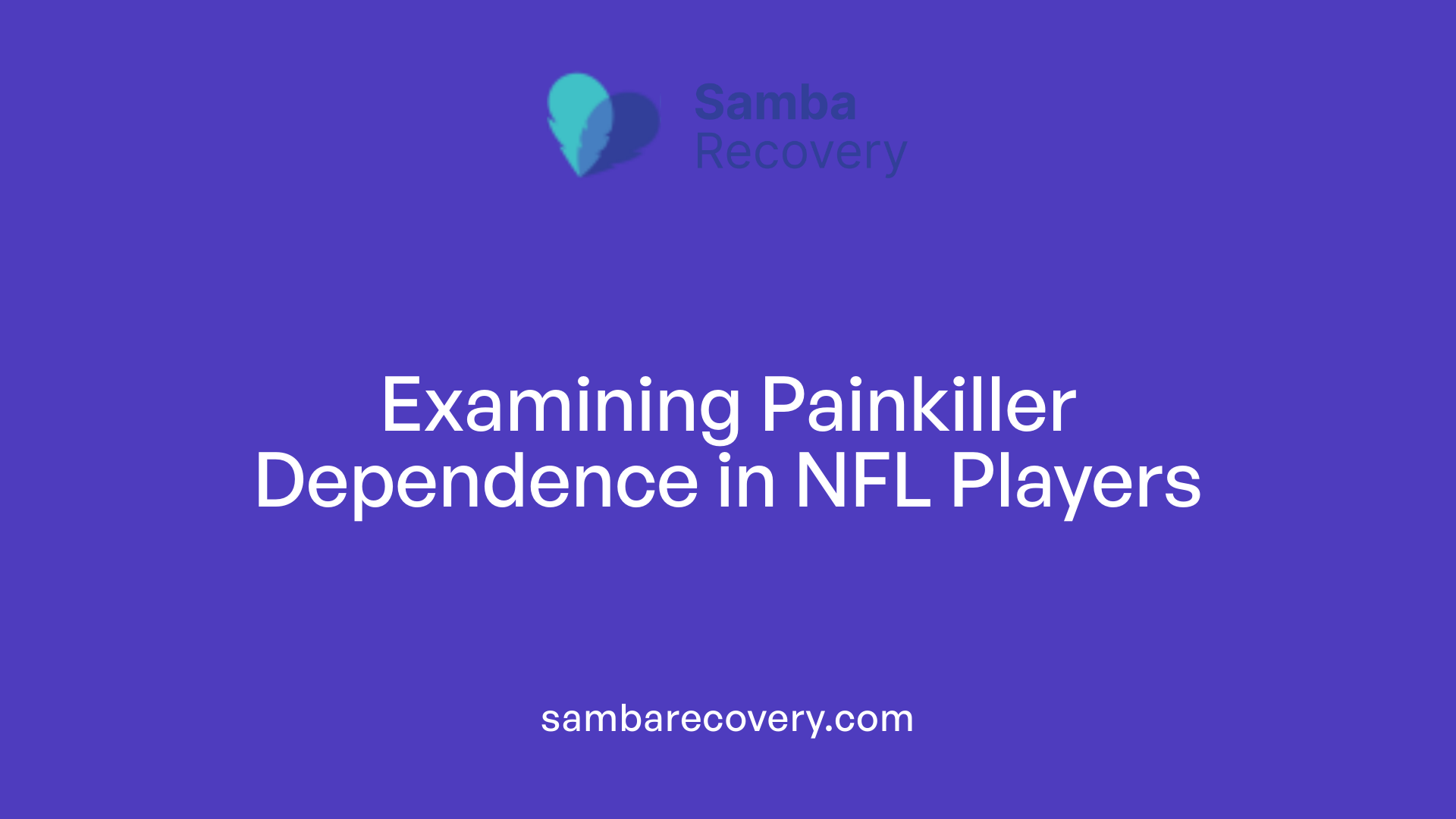
What are common practices regarding painkiller use among NFL players?
In the high-pressure environment of the NFL, pain management strategies heavily rely on the use of prescription medication, particularly opioids and non-steroidal anti-inflammatory drugs (NSAIDs). A staggering 52% of retired NFL players reported using prescription pain medication during their active careers, with 71% admitting to having misused these substances. Furthermore, a significant number of players, 63%, obtained pain medications from nonmedical sources such as teammates or coaches, showcasing a concerning trend in medication practices within the league.
The prevalence is underscored by data indicating that 26.2% of retired NFL players reported recent use of prescription opioids, while 11.9% acknowledged misuse. Commonly used medications include Toradol, known for its potency but also linked to severe side effects like kidney damage and gastrointestinal bleeding. In a culture that often prioritizes performance over personal health, many players justify the use of these medications to manage pain, indicating an environment where chronic pain management often overshadows the risks involved.
With chronic pain reported by approximately 80% of players, there’s a clear association between the ongoing pain experience and opioid usage during and after their careers. This highlights the urgent need for developing effective prevention and management programs targeting opioid misuse in NFL players, who are clearly at an elevated risk for addiction and long-term health complications.
Painkillers During Game Time: Legal and Medical Practices
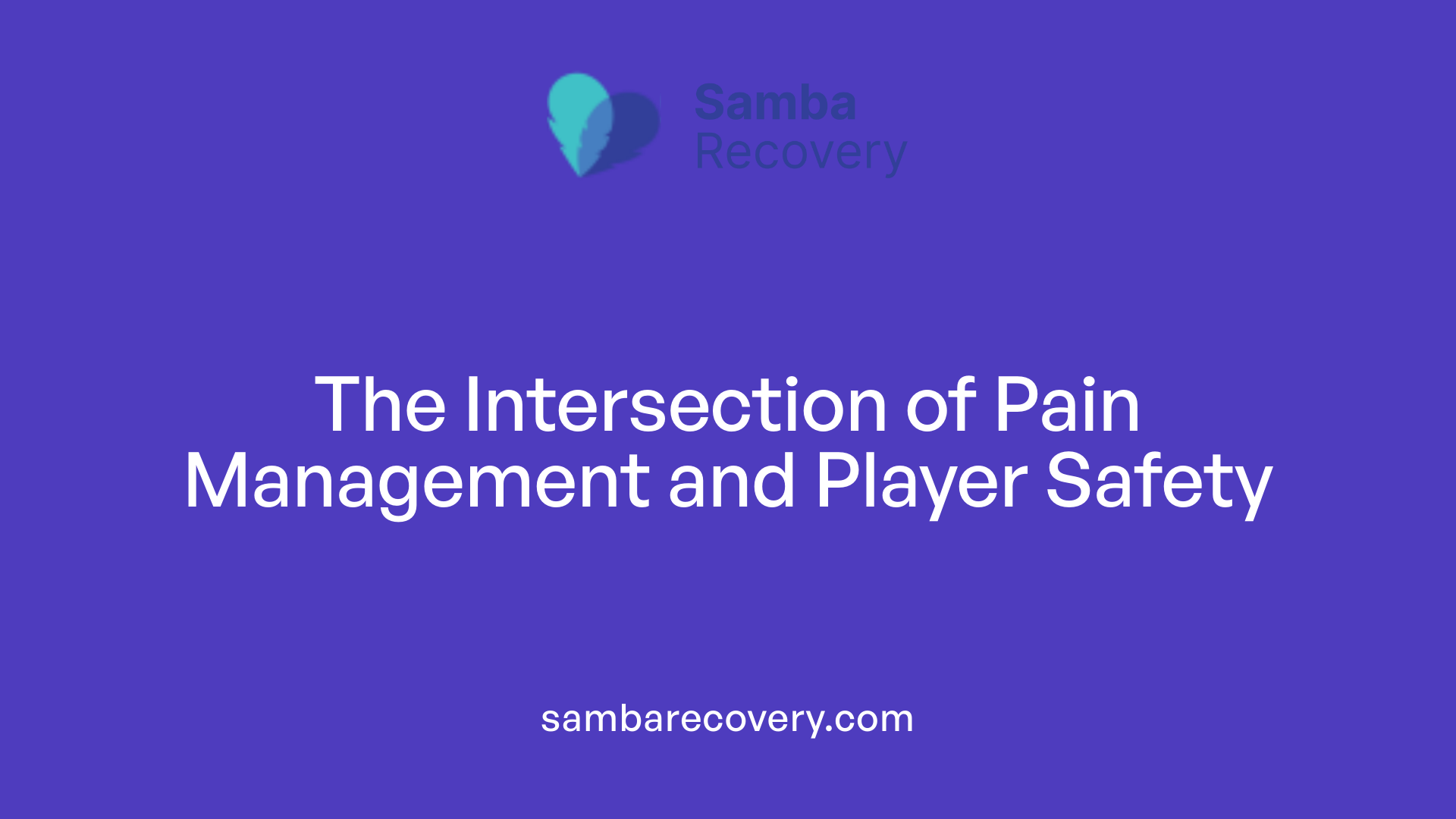
Are NFL players allowed to use painkillers during games?
Yes, NFL players are permitted to use painkillers during games, which often includes both oral and injectable forms. One of the most frequently administered medications is Toradol, a nonsteroidal anti-inflammatory drug, which is used to help players manage pain and continue competing despite injuries. This practice underscores the immense physical demand placed on players and the pressures they face to perform at high levels.
While this use of pain medications is common, it poses significant legal and ethical concerns. Over 1,500 former NFL players have initiated a class action lawsuit against the NFL and various teams. The lawsuit alleges that players frequently received painkillers without adequate information about potential long-term side effects or proper consent. Consequently, this issue has sparked an important discussion about the responsibilities of the league in ensuring player safety and the ethical implications of pain management strategies.
Legal implications
The legal landscape surrounding painkiller use in the NFL highlights serious issues regarding player health and safety. One critical point is the allegation that many team doctors administered medications without fully disclosing the risks involved. For instance, reports have surfaced claiming that powerful painkillers and anti-inflammatory drugs were prescribed liberally, sometimes without proper oversight.
Furthermore, the lack of informed consent and adherence to compliance regulations has led to claims of negligence. Former players, through their legal representatives, have raised alarms about the treatment practices within the league and the long-term consequences faced by those who have been prescribed these medications. As such, the outcome of these lawsuits could significantly impact the future regulations and practices within the NFL related to pain management.
Health Risks and Addiction Concerns
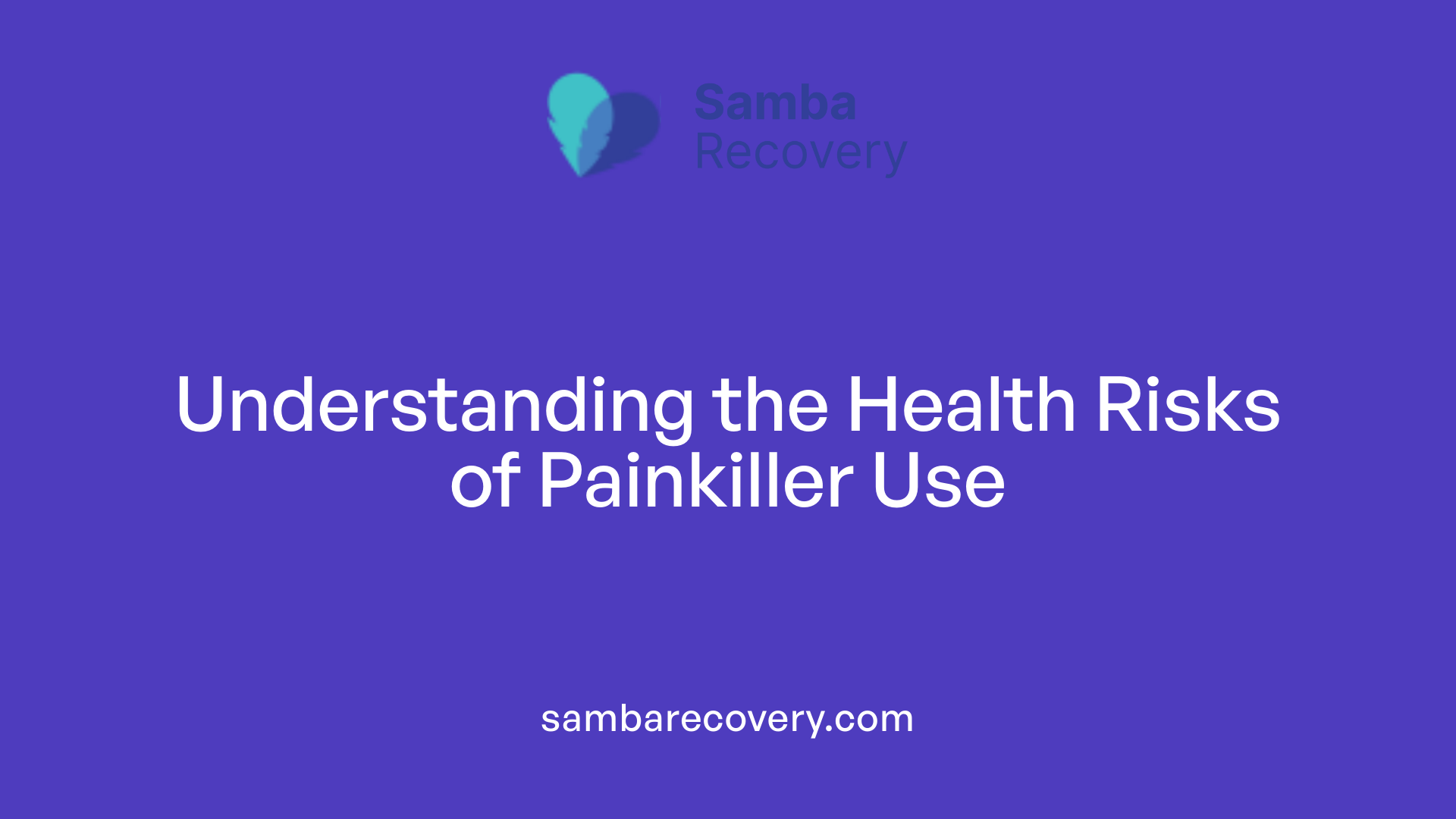
What are the health risks and addiction concerns associated with painkiller use among NFL players?
The health risks associated with painkiller use among NFL players are profound. Retired NFL players often experience chronic pain, with about 80% facing daily joint pain. This can lead to a reliance on medications that mask pain rather than provide true healing. As a result, former players may find themselves stuck in a cycle of pain and medication. Approximately one in four retired NFL players who were prescribed opioids during their careers continue to use them, indicating a dangerous trend in long-term dependency.
Misuse is a significant issue, with 11.9% reporting this behavior. Many players admit that they use opioids not just for pain relief but to cope with psychological stressors as well. The regular use of these medications can exacerbate existing health problems, leading to potential addiction and serious medical conditions like kidney damage and gastrointestinal issues.
Furthermore, the culture within the NFL encourages players to play through pain, increasing their likelihood of choosing to misuse painkillers rather than seeking alternative treatments. This trend is alarming, especially when considering that previous substance use disorders are common within this demographic, raising the odds of continued misuse and complicated health outcomes. Advocacy for better pain management practices aimed at prioritizing long-term health, such as non-pharmacological therapies, is becoming increasingly crucial.
Ethical Considerations in Pain Management
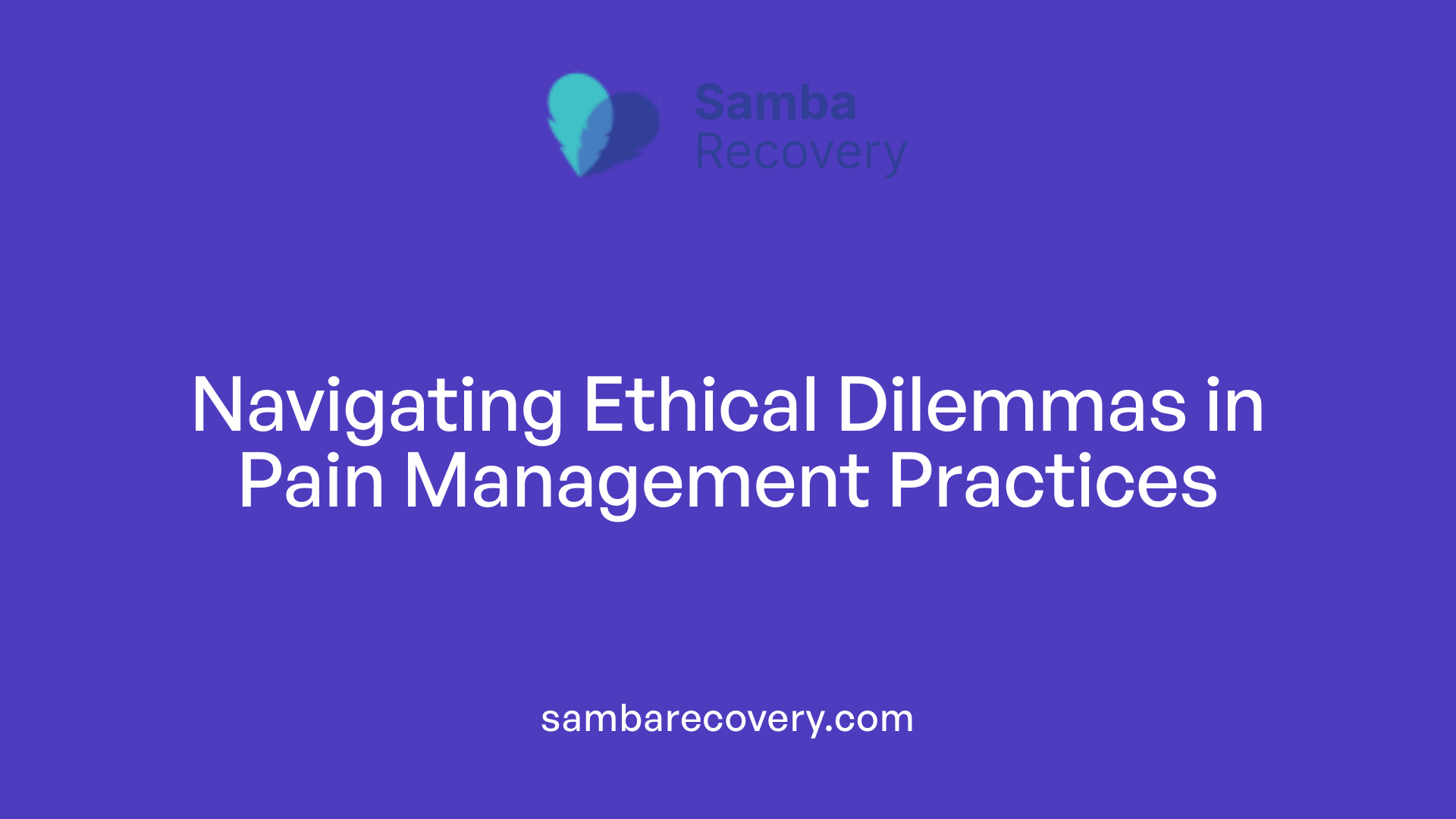
What ethical considerations exist around the use of pain medications in the NFL?
The ethical dilemmas surrounding pain medication in the NFL primarily focus on player health and safety. A study indicated that many retired players not only used opioids to alleviate pain but also to cope with stress, enhance performance, and improve their mood. This suggests a significant over-reliance on pain medications.
Moreover, the findings that 71% of retired NFL players misused prescription opioids highlight a troubling trend. Many players reported using these medications to manage persistent pain stemming from injuries. Yet, this practice put players at risk for addiction and dependency.
Complicating matters, there is a concerning correlation between opioid misuse and heightened alcohol use among players, demonstrating a potential pattern of substance abuse. This reality prompts urgent questions regarding the NFL’s approach to substance use and addiction.
It is crucial for the league to prioritize player welfare over mere performance metrics. This could involve fostering comprehensive support systems aimed at managing both pain and mental health. Additionally, ensuring that team physicians uphold ethical standards while prescribing pain medications is essential to safeguard player wellbeing in the long term.
An Overview of Current Practices
| Ethical Concerns | Implications for Players | Recommendations |
|---|---|---|
| Over-reliance on opioids | Increased risk of addiction | Comprehensive pain management |
| Lack of support for addiction | Mental health issues escalate | Enhanced mental health resources |
| Pressure to perform | Ignoring chronic injuries | Educated consent and compliance |
| Noncompliance with medical regulations | Misuse of drugs | Strict regulation enforcement |
| Informed consent deficits | Ignored health risks | Transparent medical practices |
Addressing these ethical considerations is paramount, underscoring the need for a cultural shift within the league that champions long-term health over short-term gains.
Cultural and Legal Factors Influencing Painkiller Use
What are the cultural and legal factors influencing painkiller use in professional football?
Culturally, the NFL fosters an environment where playing through pain is commonplace, with athletes often pressured to perform despite injuries. This mindset significantly contributes to the habitual use of painkillers, as players may feel compelled to prioritize immediate performance over their long-term health. In fact, 71% of retired players admitted to misusing pain medication during their careers, signaling an ingrained culture of pain management through medications.
Legally, while there are regulations surrounding the prescription and use of painkillers, the enforcement of these guidelines can be inconsistent. Reports have emerged indicating that team doctors sometimes issue prescriptions without proper oversight or patient knowledge, which raises ethical concerns regarding informed consent. The NFL’s claim of adhering to medical guidelines is challenged by allegations of prioritizing team performance over player health, as many players report feeling pressured to take medications they are uncomfortable with.
Furthermore, a significant percentage of retired players sourced their pain medications from nonmedical origins, demonstrating a systemic issue within the league. The ongoing debate about whether current regulations effectively safeguard players remains pertinent, especially given the link between misuse, addiction, and chronic pain management in the NFL.
Regulatory and Legal Issues in Painkiller Distribution
What legal issues have arisen regarding painkiller use in the NFL?
The legal issues surrounding painkiller use in the NFL are complex and troubling. Research has indicated that NFL teams have violated federal laws regarding the storage and distribution of prescription pain medications. Allegations suggest that team doctors often prescribed powerful painkillers without appropriate medical oversight, bypassing the necessary regulations meant to protect player safety.
The situation has led to extensive legal challenges. Former players have filed lawsuits against the NFL, claiming they received medications without adequate warning about the potential health risks. These cases highlight a concerning culture within the league, where the emphasis on player availability for games has reportedly taken precedence over long-term health considerations.
These lawsuits not only seek restitution but also advocate for systemic changes within the NFL concerning pain management practices. The push for more accountability and transparency in medication distribution has become a rallying point for players and advocates alike.
In addition, the league has faced scrutiny due to claims that more than 500 retired players are seeking legal remedies for what they describe as the NFL’s reckless handling of painkiller prescriptions. These allegations drive home the urgent need for regulatory reforms to ensure compliance with federal laws and safeguard player health from the potential dangers of mismanaged pain management.
| Issue | Description | Impact |
|---|---|---|
| Federal law violations | Teams accused of violating regulations for prescription drugs. | Increased scrutiny and potential legal penalties. |
| Lawsuits and legal battles | Former players challenging the NFL’s pain management practices. | Calls for reform and accountability in player health. |
| Pressure to play | Players reported feeling coerced to use painkillers to remain competitive. | Heightened health risks, including addiction. |
| Inadequate oversight | Medications dispensed with insufficient monitoring and warnings. | Serious long-term health consequences for players. |
| Advocacy for reform | Growing movement towards safer pain management practices. | Potential changes in NFL policies and regulations. |
These ongoing challenges illustrate the intricate relationship between pain management and the ethical responsibilities of the league towards its players.
Player Testimonials and Experiences
What do player testimonials reveal about the impact of painkiller use in the NFL?
Player testimonials provide powerful insights into the pervasive culture of painkiller use within the NFL, highlighting a troubling reliance on medications to manage the intense physical demands of the sport. Numerous current and former players have spoken candidly about the pressures they faced to take painkillers, often without being fully informed about the associated risks.
For instance, former player Jeremy Newberry shared alarming experiences with painkillers, stating that his use of these medications led to severe health issues, including kidney failure. Such personal accounts not only raise awareness about the physical toll of these substances but also underscore the ethical dilemmas faced by players caught between their commitment to the game and their personal health.
Impact on well-being
These stories reflect a broader trend within the NFL, where many players feel compelled to utilize pain relief strategies that prioritize short-term performance over long-term health. A significant number of players have mentioned the emotional and physical struggles that come with prolonged painkiller use, including fears of addiction and dependency.
The sentiment is echoed in discussions among players regarding how the league’s culture incentivizes pushing through pain, further exacerbating the risks associated with pain medication use. Advocates are calling for a shift in medical protocols to emphasize player well-being and encourage safer, non-pharmacological pain management alternatives.
The Role of Team Physicians and Ethical Dilemmas
How do team physicians navigate ethical dilemmas in the NFL regarding pain management?
Team physicians in the NFL face significant ethical challenges while managing players’ pain. Their role is crucial; they must provide timely pain relief to enable athletes to return to the field. However, this often conflicts with their obligation to ensure players’ long-term health and safety. Pressure from coaching staff and the inherent competitive culture can lead to over-prescription of pain medications and inadequate disclosure of potential risks.
The NFL’s culture promotes playing through pain, encouraging players to rely heavily on drugs like opioids and Toradol. Studies indicate that 63% of retired players obtained pain medication without appropriate medical guidance, showcasing a concerning pattern of misuse.
Moreover, team physicians must navigate the fine line between supporting players’ needs and adhering to regulations regarding the distribution of controlled substances. Ethical dilemmas arise when the immediate need to alleviate pain may compromise comprehensive health assessments. This complex balance raises critical questions about the league’s accountability to uphold medical ethics while ensuring player welfare.
In summary, the responsibilities of NFL team physicians encompass not only the treatment of injuries but also a grave ethical obligation to prioritize the well-being of players, often under immense external pressures that complicate their decision-making.
Alternative Pain Management Strategies
Non-Pharmacological Treatments
With rising concerns about opioid misuse and dependency among NFL players, there’s a growing push for non-pharmacological treatments for pain management. Strategies such as physical therapy, acupuncture, and cognitive behavioral therapy contribute to addressing pain without the risks associated with medication. These approaches not only aim to alleviate pain but also help in improving overall player health and functionality.
Advocated Changes in the NFL
Advocates for player health urge the NFL to implement comprehensive pain management programs emphasizing safer alternatives. This includes increased education about these therapies and integrating them into injury management protocols. As the culture around pain management shifts, the NFL can significantly enhance player health outcomes while reducing reliance on potentially damaging pain medications. Comprehensive strategies will help in balancing the physical demands of the sport with the long-term health of its athletes.
The Financial and Performance Pressures on Players
How do financial incentives impact painkiller use among NFL players?
Financial incentives and performance pressures shape the landscape of painkiller use within the NFL significantly. Players are acutely aware of the high stakes associated with their careers. With contracts on the line, the pressure to perform often overshadows concerns about health risks.
Approximately 89% of players believe painkillers are necessary to play, showcasing a mentality where performance is prioritized over well-being. This view is supported by the fact that 63% of former players obtained pain medications from nonmedical sources, revealing an alarming reliance on teammates and coaches to fulfill their pain management needs without proper medical oversight.
Moreover, players may feel a compulsion to use stronger pain relief methods to meet team expectations. The troubling correlation between financial security and medication use indicates that players are willing to risk their health for performance.
Legal allegations further underscore this issue. Numerous former NFL players have detailed their experiences of feeling pressured to use painkillers to maintain their place on the team, often without adequate information on potential long-term effects.
This culture of economic pressure and risk-taking behaviors not only affects individual health but also calls for urgent reforms in NFL policies regarding player welfare and medication practices.
The Ongoing Legal Battle and Reforms
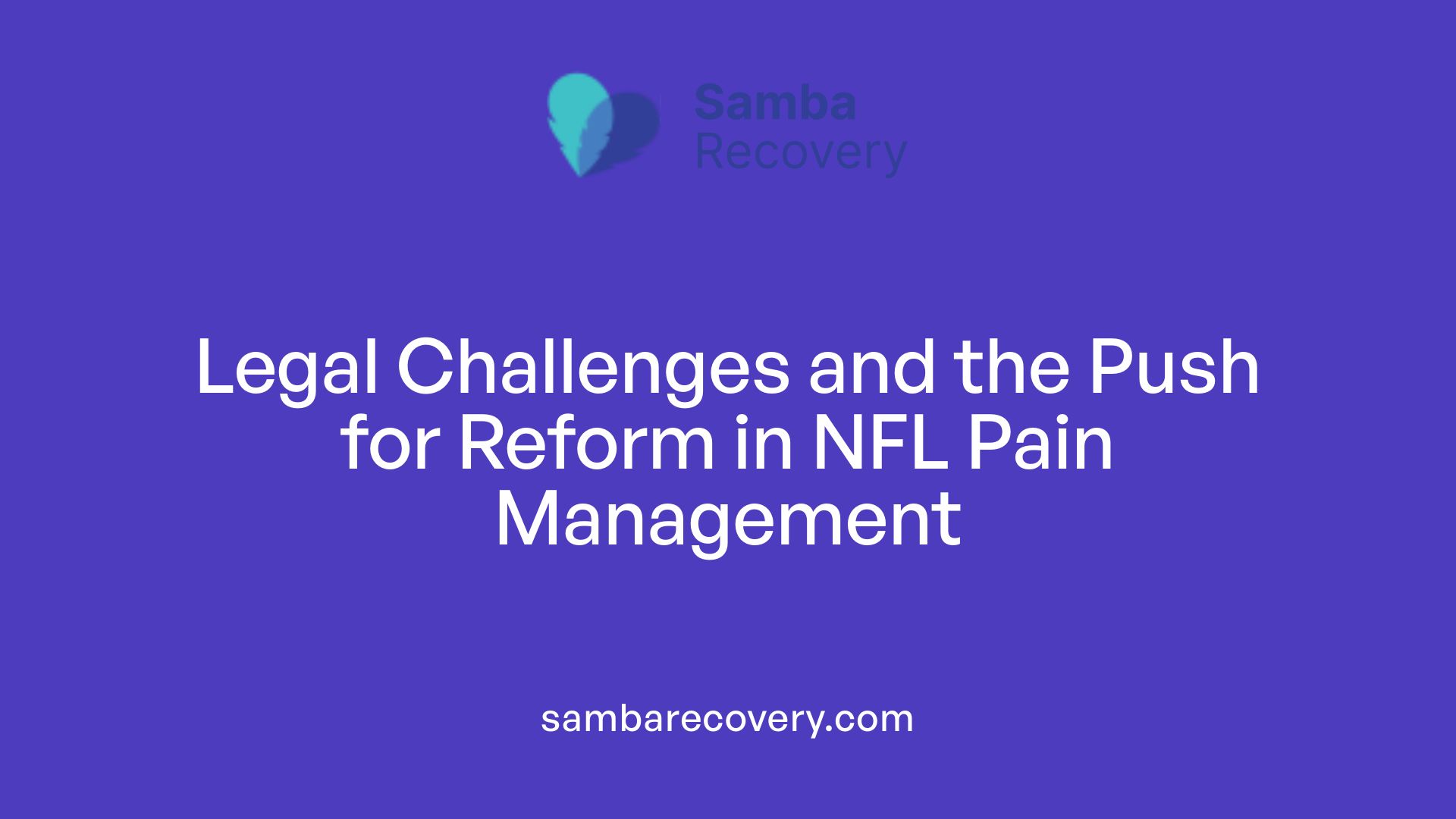
What recent lawsuits have affected the NFL’s reputation regarding painkiller misuse?
The NFL is currently mired in a series of lawsuits that accuse the league and its teams of enabling a culture of painkiller misuse. Notably, over 1,800 former players are participating in a class action lawsuit, claiming that they were pressured to take addictive pain medications without adequate safeguards or informed consent. Allegations include team doctors dispensing medications in violation of federal regulations, leading to a normalization of painkiller abuse to keep players on the field. Reports of former players suffering from severe health issues due to these practices have intensified scrutiny on the league’s handling of pain management.
What reforms have been proposed or implemented in response to painkiller misuse in the NFL?
In response to the growing allegations regarding painkiller misuse, the NFL has claimed to enact several reforms aimed at improving player health standards. These initiatives include:
- Guidelines for Prescription Use: Establishing protocols for team physicians to follow regarding painkiller prescriptions.
- Increased Oversight: Enforcing stricter compliance with medical and legal standards, particularly regarding the distribution of controlled substances.
- Medical Support Structures: Initiating programs aimed at better medical support for retired players, acknowledging their ongoing health challenges.
Despite these actions, ongoing legal battles highlight that many advocates and former players believe these reforms are insufficient. They are demanding more comprehensive changes to ensure player safety and accountability, particularly as the NFL navigates the tension between maintaining competitive integrity and addressing health risks. This dialogue is crucial as the league redefines its policies surrounding pain management.
Public Perception and the Future of Player Health
What is the public perception of the NFL’s handling of pain management?
Public perception of the NFL’s management of pain has grown notably critical over recent years. High-profile lawsuits involving former players have shed light on the league’s alleged systemic problems regarding prescription pain medication distribution. Many players have come forward with testimonials outlining their experiences, indicating negligent practices and a culture that prioritizes game day readiness over player well-being.
Concerns frequently center on the misuse of powerful painkillers, the pressure exerted on players to perform while injured, and inadequate medical oversight. Recent statistics showing that 71% of retired NFL players admitted to misusing pain medications has fueled the public’s dissatisfaction and concern about the league’s commitment to player safety.
What anticipated changes in policies could emerge?
The growing scrutiny of the NFL’s practices has prompted calls for adoption of more transparent and responsible health policies. Stakeholder pressure, amplified by legal challenges, suggests potential shifts towards prioritizing player safety. The NFL has begun implementing stricter guidelines for how medications are managed, yet many believe these measures remain inadequate.
As awareness of the long-term health effects of opioid misuse and other pain management practices rises, we may expect the NFL and other professional sports organizations to adopt improved protocols and alternative pain management strategies that prioritize player health and well-being in the future.
Conclusion: Rethinking Pain Management in the NFL
The question of whether the NFL pushes painkillers on players is multifaceted, touching on health, ethics, and legal dimensions. While pain management is an essential aspect of professional football, the approach has often led to controversy, raising valid concerns about player safety and organizational responsibility. By addressing the challenges and seeking improvements in medical practices, the NFL can better safeguard its athletes’ health and well-being, ultimately ensuring a more sustainable future for the sport.
References
- Does the NFL Push Painkillers on Football Players?
- The Dark Side Of The NFL: Painkiller Practices
- Does the NFL Push Painkillers on Football Players?
- Is the NFL Pushing Painkillers on Football Players? – Arista Recovery
- The NFL’s Drug of Choice – Bleacher Report Media Lab
- OTL: Painkiller misuse numbs NFL pain – ESPN
- Does the NFL Push Painkillers on Football Players? – Oasis Recovery






